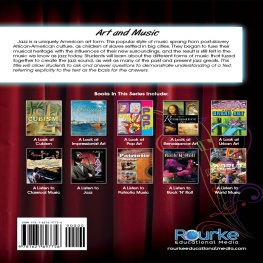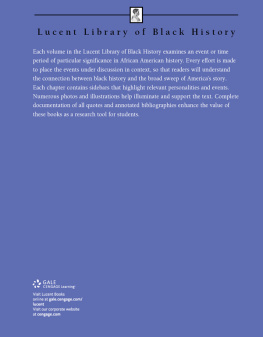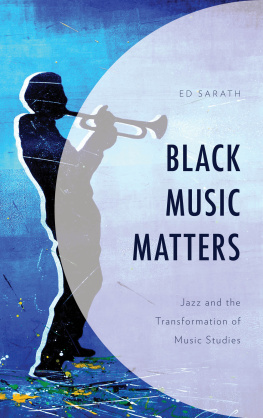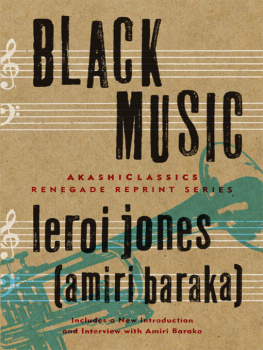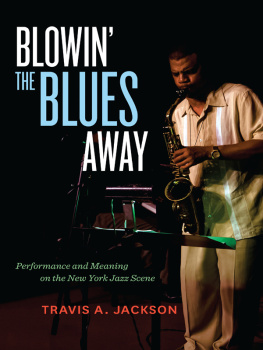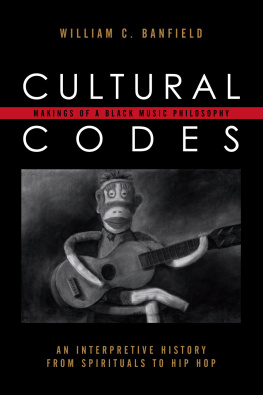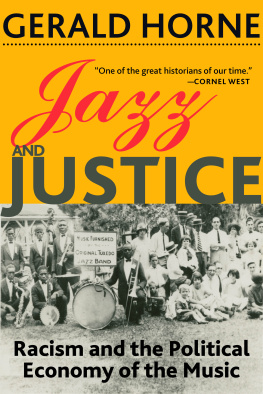About the Author
Jean-Philippe Marcoux is a professor of American literature at Universit Laval in Quebec, Canada. He specializes in African American literature, post-modernist fiction and poetry, as well as in jazz studies.
Acknowledgments
This book was inspired in parts by the writings on African American music of Steven C. Tracy, Lawrence Levine, Amiri Baraka, Aldon Lynn Nielsen, Kimberly W. Benston, Samuel A. Floyd Jr., Meta DuEwa Jones, Mark Anthony Neal, as well as the writings of William Van DeBurg, Paul Berliner, Ingrid Monson, and Brian Ward, who have explained how music is the language of the black experience, of particular moments in a history of struggles, and who have theorized the music as a continuous dialogue with the soul of a people.
Special thanks to:
Caroline Brown, who supervised early versions of this material and who helped me when this project was, at the time, a dissertation. You were the first to believe that this was a book waiting to be written.
Sonia Sanchez, who encouraged me on the phone to pursue the project and convinced me of its significance. Thank you for your generosity with your work.
David Henderson, who granted me a lengthy interview filled with advice and wonderful stories. Thank you for being so generous with your time whenever I needed to ask you for something.
Aldon Nielsen, who might not remember giving me, in an elevator in San Francisco, the key to unlock my discussion of Sanchezs a/coltrane/poem. He asked me, So, how did you cut it? In fact he might not remember my name...
Martha Cutter, editor of MELUS, and the two referees who looked at versions of a paper that became part of the chapter on Henderson. Thank you for the careful, attentive readings and constructive criticisms.
Justin Race, my editor, who took the many calls of an anxious writer, and who always supported me during the processes of revisions and production. Thank you for your patience, your reassurance, and for taking a chance on this project. Special thanks to Sabah Ghulamali for the support, the laughter, and the very creative exchanges!
Justin Bisanswa and Chantal Fortier for the advice and the support; Sophie Robichaud for the wonderful work in the last stages of the manuscript; Brad Kent and Elspeth Tulloch for being extraordinary colleagues.
Finally, Isabelle and Alexandre, the great loves of my life, who saw this project come to life and who were generous and gracious enough to the give me the gift of time; thank you to my friends and family for the gift of love and friendship.
Jean-Philippe
February 2012
Bibliography
Primary works
Baraka, Amiri/Leroi Jones. Autobiography of Leroi Jones. New York: A Cappella Publishing, 1995.
. Black Magic: Poetry 1961-1967. New York: Bobbs-Merrill, 1969.
. Black Music. Westport, CT: Greenwood Press, 1980.
. Blues, Poetry, and the New Music. The Music: Reflections on Jazz and Blues. New York: William Morrow, 1987. 262-267.
. The Blues Aesthetic and the Black Aesthetic: Aesthetics as the Continuing Political History of a Culture. Black Music Research Journal 11.2 (1991): 101-09.
. Blues People: The Negro Experience in White America. New York: Morrow Quills Paperbacks, 1963.
. City of Harlem. Home: Social Essays. The Dark Towers Series. Ed. Early, Gerald. 1st Ecco ed. Hopewell, N.J.: Ecco Press, 1998. 87-93.
. Coltrane Live at Birdland. Black Music. Westport, CT: Greenwood Press, 1980. 63-68.
. Conversations with Amiri Baraka. Ed. Charlie Reilly. University of Mississippi Press. 1994.
. Cultural Revolution and the Literary Canon. Callaloo 14.1 (1991): 150-156.
. A Dark Bag. Home: Social Essays. The Dark Towers Series. Ed. Early, Gerald. 1st Ecco ed. Hopewell, N.J.: Ecco Press, 1998. 121-132.
. Digging: The Afro-American Soul of American Classical Music. Berkeley: University of California Press, 2009.
. Expressive Language [1963]. The Poetics of the New American Poetry. Eds. Donald M. Allen, Warren Tallman. New York: Grove Press, 1973. 373-377.
. Eulogies. Toronto: University of Toronto Press, 2001.
. The Fire Must Be Permitted to Burn Full Up. Raise, Race, Rays, Raze: Essays since 1965. New York: Random House, 1971. 117-123.
. Greenwich Village and African-American Music. The Music: Reflections on Jazz and Blues. New York: William Morrow, 1987. 181-189.
. Griot/Djali: Poetry, Music, History, Message. Digging: The Afro-American Soul of American Classical Music. Berkeley: University of California Press, 2009. 5-8.
. Home: Social Essays. The Dark Towers Series. Ed. Early, Gerald. 1st Ecco ed. Hopewell, N.J.: Ecco Press, 1998.
. Jackie Mc Coming and Going. Digging: The Afro-American Soul of American Classical Music. Berkeley: University of California Press, 2009. 237-239.
. A Jazz Great: John Coltrane Black Music. Westport, CT: Greenwood Press, 1980. 56-62.
. John Coltrane (1926-1967). Eulogies. Toronto: University of Toronto Press, 2001. 14-16.
. The Leroi Jones/Amiri Baraka Reader. William J. Harris, ed. New York: Thunders Mouth Press, 1991.
. The Music: Reflections on Jazz and Blues. New York: William Morrow, 1987.
. The Need for a Cultural Base to Civil Rites and Bpower Mooments. Raise, Race, Rays, Raze: Essays since 1965. New York: Random House, 1971. 39-48.
. New Music/New Poetry. The Music: Reflections on Jazz and Blues. New York: William Morrow, 1987. 243-245.
.Philistinism and the Negro Writer. In Anger and Beyond: The Negro Writer in the United States. Ed. Herbert Hill. New York: Harper, 1966. 51-61.
. Raise, Race, Rays, Raze: Essays since 1965. New York: Random House, 1971.
. Selected Poetry of Amiri Baraka/Leroi Jones. New York: William Morrow & Company, 1979.
. 7 Principles of US: Maulana Karenga & The Need for a Black Value System. Raise, Race, Rays, Raze: Essays since 1965. New York: Random House, 1971. 133-146.
. Sonny Rollins. Black Music. Westport, CT: Greenwood Press, 1980. 52-55.
. Transbluency. The Selected Poems of Amiri Baraka/Leroi Jones (1961-1995). Eds. Amiri Baraka, Paul Vangelisti. New York: Marsilio, 1995.
. Wise Whys Ys. Chicago, IL: Third World Press, 1995.
. Work Notes-66. Raise, Race, Rays, Raze: Essays since 1965. New York: Random House, 1971. 11-16.
Baraka, Amiri and Larry Neal, eds. Black Fire; an Anthology of Afro-American Writing. Baltimore: Black Classic Press, 2007.
Henderson, David. De Mayor of Harlem. New York: E. P. Dutton, 1970.
. Felix of the Silent Forest. New York: The Poets Press, 1967.
. The Low East. Richmond, CA: North Atlantic Books, 1980.
. Neo-California. Berkeley, CA: North Atlantic Books, 1998.
. 'Scuse Me While I Kiss the Sky: Jimi Hendrix, Voodoo Child. New York: Atria Books, 2008.
Hughes, Langston. Ask Your Mama [1961]. In The Collected Poems of Langston Hughes. Eds. Arnold Rampersad and David Roessel. New York: Vintage Classics, 1994. 472-531.
.The Big Sea [1940]. New York: Hill and Wang, 1993.
.The Best of Simple [1961]. New York: Hill and Wang, 1989.
.Bop. The Best of Simple. New York: Hill and Wang, 1989.117-119.
. The Collected Poems of Langston Hughes. Eds. Arnold Rampersad and David Roessel. New York: Vintage Classics, 1994.
.The Collected Works of Langston Hughes Volume 9, Essays on Art, Race, Politics, and World Affairs. Ed. Christopher De Santis. Columbia: University of Missouri Press, 2001.
.


